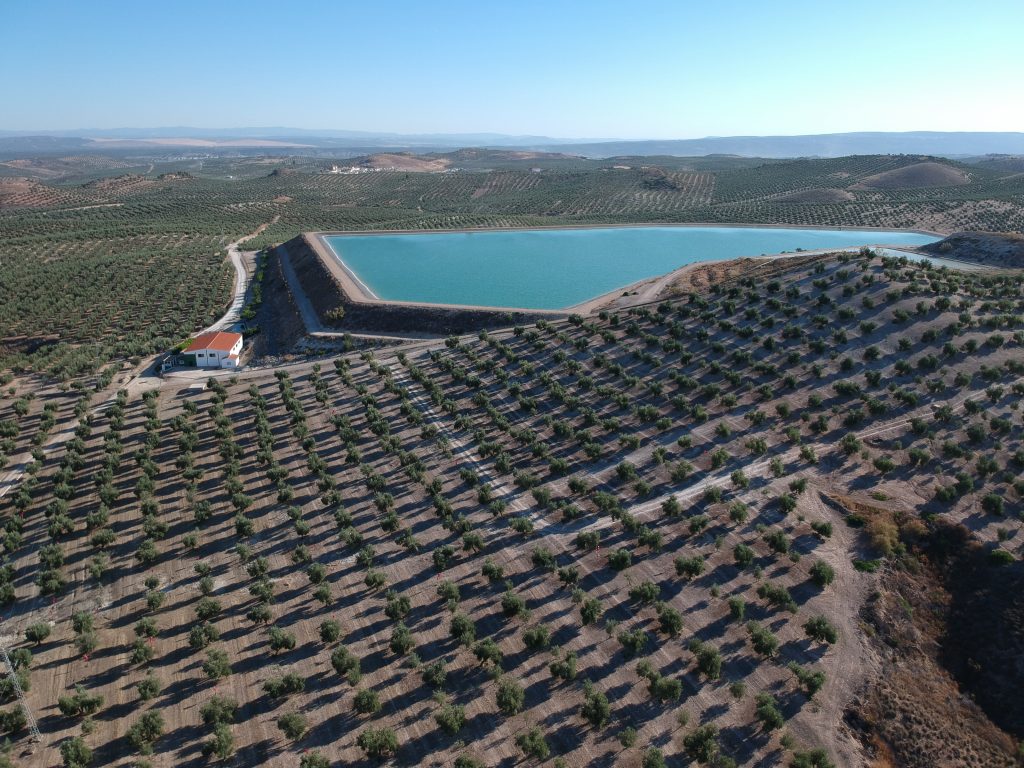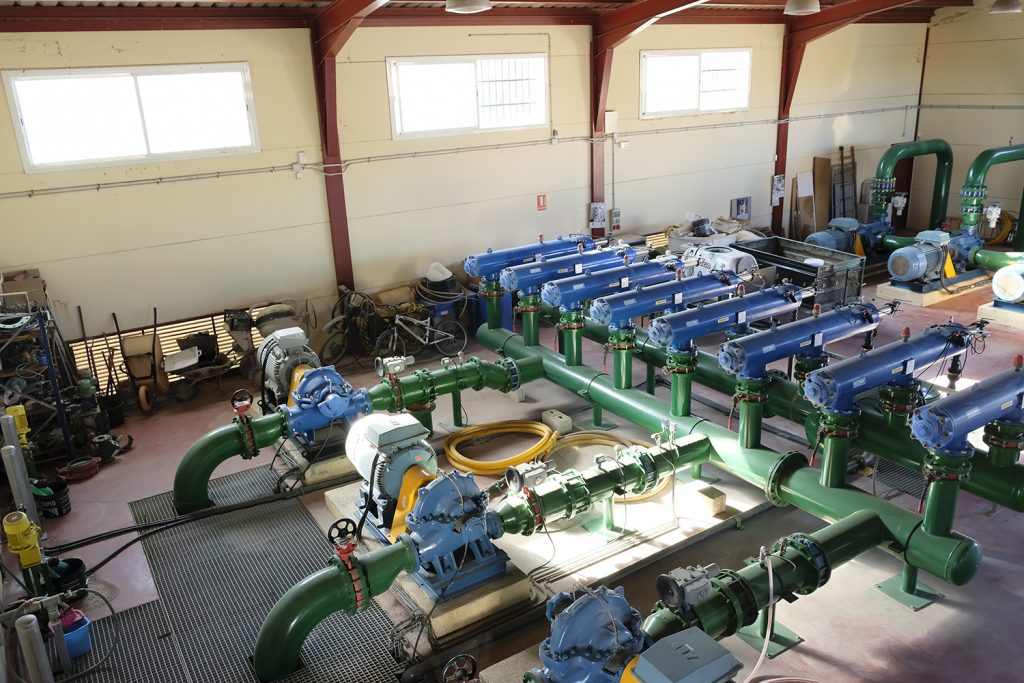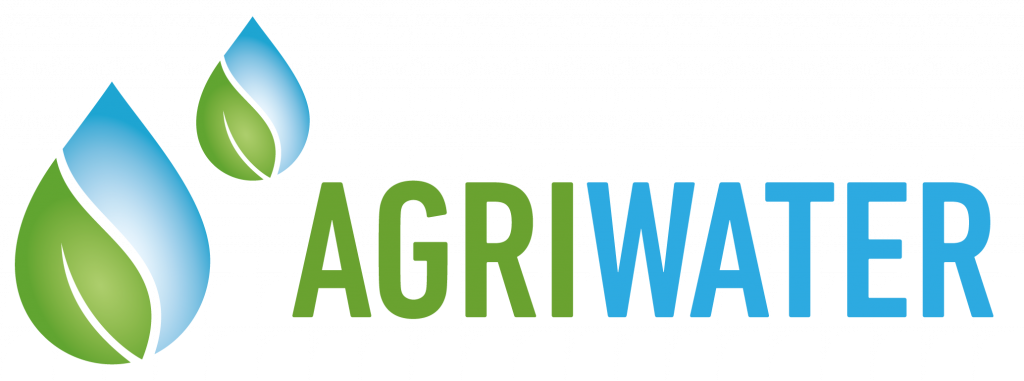Farm area/size of the organisation:
Number of workers:
Farm main activity:
Continental climate with very hot summers (40°C); 500 mm of rainfall which in recent years has dropped to 300-350mm.
The soils are clayey with subsoils affected by salinity which complicates the use of groundwater for agricultural use.

Organisation, constitution, construction, and start-up of an irrigation community that brings together more than 100 farms and almost 1,500 ha of olive groves.
The infrastructures consist of three sections: catchment, reservoir, and distribution. The water is collected from the Guadalquivir River 7 km from the storage point, from where it is pumped to a reservoir of 1 cubic hectometre from where it is distributed to each plot with an annual supply of 1500 m3/ha.
The fundamental objective of the constitution of an irrigation community is to facilitate access to water for farmers in a region or district.
Thanks to this legal figure it is possible to undertake infrastructure that otherwise could not be built on an individual basis.
The creation of an irrigation community is justified by legal requirements, as this association is necessary for the management, organisation, and planning of irrigation for a group of farmers.
For most of these farmers, it has meant the conversion from rainfed to irrigated land, with an impact on the productivity, profitability, and labour requirements of their farms.
Most of the area was formerly rainfed with low average yields and high variability between years.
Some had small groundwater concessions, but with salinity problems. To avoid duplication, these concessions have had to be regularised after integration into the irrigation community.
There must be a cooperative spirit that favours the acceptance of working with other farmers, for which it is necessary to create an environment that generates trust.
Legal advice is needed to obtain the irrigation concession and infrastructure advice for the development and control of the necessary works and installations.
Many farms were converted from rainfed to irrigated land, stabilising their annual production, and tripling their productivity, as well as increasing the value of their assets.
Each member had to assume an investment of €6.000/ha, the amortisation of which is between 3 and 4 years.
In addition, each member must pay around €500/ha per year for fertiliser, electricity, and water charges.
The community undertook major works for which a satisfactory environmental assessment was required.
Irrigation made it possible to maintain vegetation cover, as irrigation generates less competition with cultivation.
In addition, the community has allowed for rational water management and planning, which would have been more complex with 100 individual initiatives.
From the social point of view, the irrigation of a large area, affecting many farmers, has an impact on the income of the region where it is located.
The irrigated farms have a greater need for labour for the work and harvesting, making it possible to redistribute income among the local population.
As with any democratic cooperative system, conflicts can arise when it comes to decision-making. For this it is always very important to maintain a technical criterion and to be advised by external suppliers.
From a structural point of view, it is very important to maintain and control the pond to avoid leaks and damage to the structure.
Many farms were converted from rainfed to irrigated land, stabilising their annual production, and tripling their productivity, as well as increasing the value of their assets.
Each member had to assume an investment of €6.000/ha, the amortisation of which is between 3 and 4 years.
In addition, each member must pay around €500/ha per year for fertiliser, electricity, and water charges.
The community undertook major works for which a satisfactory environmental assessment was required.
Irrigation made it possible to maintain vegetation cover, as irrigation generates less competition with cultivation.
In addition, the community has allowed for rational water management and planning, which would have been more complex with 100 individual initiatives.
From the social point of view, the irrigation of a large area, affecting many farmers, has an impact on the income of the region where it is located.
The irrigated farms have a greater need for labour for the work and harvesting, making it possible to redistribute income among the local population.
As with any democratic cooperative system, conflicts can arise when it comes to decision-making. For this it is always very important to maintain a technical criterion and to be advised by external suppliers.
From a structural point of view, it is very important to maintain and control the pond to avoid leaks and damage to the structure.
The associative form itself constitutes an innovative element that facilitates the possibility of developing infrastructures for the irrigation of large areas.
It is a tool for financing, organisation, management, and control, protected by the water law, which guarantees integration in the planning of the Guadalquivir basin and a more efficient use of resources.
The cooperative spirit of the community members and the creation of an atmosphere of trust is very important.
Technical and legal advice is fundamental; in the case of this community, some of the members were construction professionals, which helped to reduce the cost of the works and to better control costs and quality.
The infrastructure had to cover a long distance, first 7 km from the river to the reservoir and then 15 km from the reservoir to the last irrigation point.
In addition, the steepness of the terrain, up to 140 m of slope, made it necessary to sectorise and install more pumping capacity with greater investment and energy costs.
At first, the potential members had to be convinced of the opportunity to establish the irrigation community. Many were reluctant to lose control over the financing of the infrastructure.
It was particularly difficult to obtain authorisation for the plots of land through which the 7 km of catchment pipes to the reservoir had to pass.
In many cases, negotiation work was very important to convince all the people involved. Building trust and being flexible is essential.
About physical and technical difficulties, it must be accepted that finding a solution to them sometimes requires a greater financial effort, for which it is essential to find financial support through grants or loans with preferential conditions.
“The switch from rainfed to irrigated farming is essential for the sustainability of farms. Increased productivity and stabilisation of the farms guarantees the sustainability of this conversion”.
“Setting up an irrigation community is a basic tool, it is the only way to face investments that would otherwise be impossible to make on an individual basis”.
The conversion of rainfed olive groves to irrigation is one of the most efficient conversion processes in terms of water use due to the reduced consumption per hectare compared to other crops.
This community has also followed all the hydrological and environmental planning requirements, so its sustainability is guaranteed.
The properties affected have seen their asset value increase, as well as guaranteeing their economic sustainability with higher and more stable production.
The investments undertaken are estimated at around €6,000/ha with a payback period of 3-4 years, which means that the community members have been reaping the rewards of setting up the irrigation community for years.
This type of structure is especially recommended in regions with significant water shortages, where there is a water supply point and the characteristics of the crop make it possible to make a productive leap that justifies the development of this initiative.
To be able to undertake this initiative, there must be a legal figure that makes its constitution possible.
This figure must be integrated into the hydrological plans, as it participates in the water management of the basin where it is located.
This form of association is particularly interesting, as it enables the development of investments for irrigation infrastructures that are beyond the capacity of the individual.
If it also involves the transition of large areas from rainfed to irrigated land, the economic, environmental, and social implications justify its development.
As a cooperative tool, there are difficulties in decision-making, so it is important to consider the needs of all and to create an environment of trust.
Enormous efforts have been required to obtain authorisations and permits, which, together with the complexity of the necessary structures, make technical and legal advice essential for success.


AGRIWATER project has been funded with the support from the European Commission, with the reference number 2020-1-CZ01-KA204-078212. The content of this website reflects the views only of the author, and the Commission cannot be held responsible for any use which may be made of the information contained therein.

At AGRIWATER we take the protection of your personal data very seriously. Our purpose is to protect the privacy of the data you provide us and to comply with the current regulations on the protection of personal data.
In compliance with the Act 3/2018 of 5 December on the Protection of Personal Data and Guarantee of Digital Rights transposing Regulation (EU) 2016/679, we inform you of the following information about our privacy and data protection policy:
The organization responsible of your data is Asociace soukromeho zemedelstvi Ceske republiky, ID E10133738. This is a non-governmental organization located in Prague, Czech Republic.
Address
Samcova 1177/1
11000
Praha 1
Telephone
+420266710413
+420266710414
Email contact
marketa.sandova@asz.cz
The legal basis for the treatment of your data is the consent of the data subject under article 6.1 a) of the Regulation, as well as the legitimate interest of the data controller under article 6.1 f) of the Regulation.
The data we request from you are adequate, relevant and strictly necessary and in no case are you obliged to provide them to us, but their non-communication may affect the purpose of the service or the impossibility of providing it.
Your data will be kept for the time required for the proper provision of the service offered, as well as to meet the responsibilities that may arise from it and any other legal requirement.
In the course of processing your data, Asociace soukromeho zemedelstvi Ceske republiky may share your data with:
On Projects Advising SL, as web management and maintenance service providers.
The controller retains the right to restrict the rights set forth in Article 23 of the EU Regulation, if such restriction is provided to safeguard, in particular fundamental rights and freedoms and is a necessary and proportionate measure.
If any interested party considers that their data are not being treated correctly, they can send their complaints to the following e-mail address; kristyna.strnadova@asz.cz, Asociace soukromeho zemedelstvi Ceske republiky.
The data subject declares to have acquired all this information.

A cookie is a file that is downloaded and executed on your computer, phone, or mobile device when you access certain web pages. Cookies allow a website, among other things, to store and retrieve information about user’s browsing habits and recognize the user depending on the information they contain and the way they use their computer.
Cookies do not harm your computer and are necessary to facilitate navigation.
Cookies are necessary for our website to work properly. The purpose of our cookies is to improve the user’s browsing experience. They can be used to remember your preferences (language, country, etc.) during navigation and on future visits.
The information collected in the Cookies also allows us to improve the website and adapt it to the individual interests of users, speed up searches, etc.
Analysis Cookies: These, if they are used properly by us or by third parties, allow us to quantify the number of users and thus perform the measurement and statistical analysis regarding the users’ usage of our service.
Advertising Cookies: These, if they are used properly by us or by third parties, allow us to manage as effectively as possible the supply of advertising space on the website, adapting the content of the advertisement to the content of the service requested or to the use you make of our website.
Our cookies do not store information about your personal identification, address, password, credit or debit card details, etc.
The information stored in the website’s cookies is used exclusively by us, apart from those identified below as “third party cookies”, which are used and managed by external entities to provide us with services to improve our own services and the user’s experience when browsing our website.
Third party cookies are mainly used to obtain statistics and to guarantee the payment operations are carried out.
Yes, firstly, you must disable cookies in your browser and, secondly, delete the cookies stored in your browser associated with this website.
You can restrict, block, or delete cookies from this website at any time by modifying your browser settings. This setting is different for each browser. For more details on the configuration of cookies in your browser, please consult your browser’s “Help” menu.
It is possible that some of the website’s features may no longer work if you disable cookies.
These Cookies are used to identify the user during the session, prevent the user from having to repeat authentication processes on the website, speed up some website processes, remember selections made during the session or on subsequent accesses, remember pages already visited, etc.
COOKIES
PURPOSE
DURATION
MANAGEMENT
User identification
They are used to identify and authenticate the user. They also contain technical data from the user session, such as connection timeout, session identifier, etc.
Session
AGRIWATER
Session identification
They identify the user’s http session. They are common in all web applications to identify requests from a user’s session.
Session
AGRIWATER
Navigation status
They help identify the user’s browsing status (login, first page, first access, scroll status, voting status, etc.).
Session
AGRIWATER
These Cookies obtain generic information about users’ accesses to the website (not the content of the same) to subsequently provide us with information about these accesses for statistical purposes.
COOKIES
PURPOSE
DURATION
MANAGEMENT
Google Analytics (__utma, __utmb, __utmc, __utmd, __utmv, __utmz, _ga…)
They allow website statistic’s tracking through the Google Analytics tool, which is a service provided by Google to obtain information about user access to websites. Some of the data stored is: number of times a user visits the website, dates of the user’s first and last visit, duration of visits, from which page the user accessed the website, which search engine was used or which link was clicked, from which part of the world the user accessed the website, etc. The information generated by the cookie about your use of the website will be directly transmitted and stored by Google Inc (a company located in United States). The configuration of these cookies is predetermined by the service offered by Google, so we suggest you consult the Google Analytics privacy page, for more information on the cookies it uses and how to disable them (keep in mind that we are not responsible for the content and accuracy of third-party websites).
Persistent
Third Parties